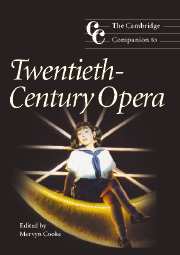1 - Opera in transition
from Part one - Legacies
Published online by Cambridge University Press: 28 September 2011
Summary
‘More books on Wagner! Yes, the cry is still they come.’ Since the first two sentences of a review article in the Musical Times for November 1899 (volume 40, 744) would not seem out of place in a similar context more than a century later, the reader of this introductory chapter might anticipate a sermon on the text ‘plus ça change, plus c'est la même chose’. Even allowing for the fact that opera-goers in 1899 were not able to bolster their ‘live’ listening with a wide choice of performances on CD and DVD, and were not yet travelling to opera houses by private car in casual clothes, still less jetting off to Adelaide or Santa Fe to catch a rarity or a special, star-studded production of a classic, it might still be reassuring to emphasize elements of cultural common ground between then and now: and a description of the world of opera at the end of the nineteenth century which underlines its tradition-establishing role for the new century becomes even more plausible when the topic of repertory is considered.
During the 1899 Covent Garden season, which ran from early April to late July, there were 69 performances, all of operas which were composed during the nineteenth century, with the sole exception of Mozart’s Don Giovanni, heard three times. The programme extended from Beethoven’s Fidelio (performed only once) through Bellini’s Norma, Donizetti’s Lucia di Lammermoor, Meyerbeer’s Les Huguenots, Wagner’s Der fliegende Holländer, Tannhäuser and Lohengrin, Verdi’s Rigoletto and Aida, Leoncavallo’s Pagliacci, Mascagni’s Cavalleria rusticana, Wagner’s Die Walküre, Tristan and Die Meistersinger, as well as Gounod’s Faust, Berlioz’s Roméo et Juliette and Bizet’s Carmen – with, as novelties, Mancinelli’s Ero e Leandro, de Lara’s Messaline, Adam’s Le Chalet and Puccini’s La Bohe`me (Musical Times, 1899, 536).
- Type
- Chapter
- Information
- The Cambridge Companion to Twentieth-Century Opera , pp. 1 - 13Publisher: Cambridge University PressPrint publication year: 2005



